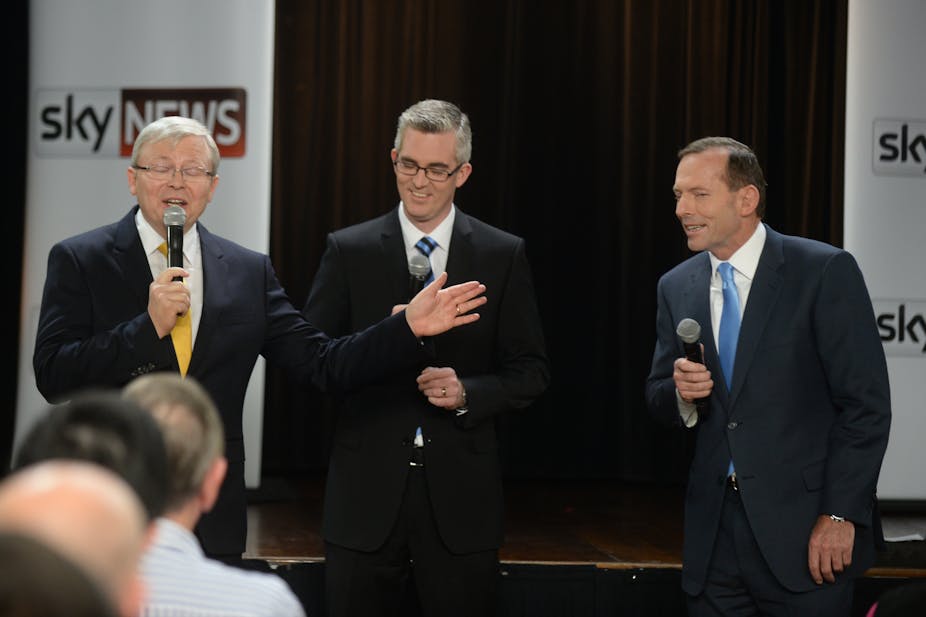By accident more than design, it seems that Australia - like the United States and the United Kingdom - will have three prime ministerial debates prior to the election.
At the end of last night’s debate at the Broncos Leagues Club in Brisbane, prime minister Kevin Rudd seemed almost taken aback by moderator David Speers’ assertion that there would be another debate in a week’s time. How ironic if we are getting a third debate because Rudd, the man who proposed an electoral debates commission prior to the 2007 poll and then failed to deliver one, was “bounced” into accepting a third debate by Sky News.
We may never know, but with last night’s hour clearly more engaging than the dull “press conference” of the first National Press Club effort, perhaps the Rooty Hill event in Sydney’s west will be a further improvement.
We can but hope. Because with the content and format of these debates agreed in the tense days prior to the poll, candidates and parties understandably only agree to rules, venues and formats they believe will be to their advantage.
It is an immature and unlikely way to achieve an outcome that would allow the electorate to truly engage with and understand the different policies on offer. The process affects the outcome. Get the first wrong and the second doesn’t really stand a chance.
As with the first debate, last night’s “people’s forum” bore all the hallmarks of a hastily arranged affair resulting from a swift negotiation between the political parties, leaders’ offices and their broadcaster of choice. Although having people rather than members of the Canberra press gallery added a more authentic touch, the questions weren’t penetrating enough to result in terribly much more than the rehearsed lines and statements that the two men were going to make irrespective of the question. There was also no ability for the questioner to reveal their assessment of the answers: a question from the floor, two - sometimes more - over-length answers and then swiftly on to the next question.
How different it could be. If a bipartisan commission was established with representation drawn from those with a deep professional understanding of democracy, broadcasting and new media, Australia could demonstrate its capacity for democratic innovation again. For much as these debates are part theatre, part boxing match, they matter.
Done well, debates have the capacity to reveal both the nature of alternative policies and be the stimulus to greater understanding and debate through other media. They can enhance and strengthen democratic engagement and with it the quality of our national leadership.
Contrast media discussion of the first debate here as if it were a sporting match, with the pages of analysis in the print media on the substance of what was said and committed to following each of the prime ministerial debates in the UK in 2010. Or the way in which the New York Times fact-checked each of the statements made in each of the US presidential debates with a group of experts on domestic and international policy.

Or even with the US Presidential Debates Commission having agreed the number, format, timing and venue for each of the Romney-Obama debates a year prior, how the dynamics in the first debate created a different context for the second and third. Agree even the most basic rules for the debate before the campaign, and it helps provide that campaign with structure: a beginning, a middle, and an end with different policy areas the subject of each debate.
And there are ways to enhance democracy through the crafting of the questions as well as the analysis of the answers. There is surely a third way somewhere between the hi-vis jacket of the building worker at the Broncos Leagues Club and the besuited members of the Canberra press gallery going through the paces.
What are the five key economic questions that should be asked of our prospective prime ministers? How refreshing and engaging it could be if an electoral debates commission were to convene a group of eminent economists and then, in the months prior to the election, seek public input through online voting on those draft questions. The same could done with the environment, national security and other areas of policy.
Whether in front of the crowd in the Roman forum - or in front of the television cameras in the studio - matters of theatre and performance have always been an element in the pursuit of power. They will remain so. But our politics and the policies that flow from it are more than cabaret. They have a deep effect on all our futures.
It’s fantasy perhaps. But what a legacy it would be for the next debate to end with more than an announcement of another, but an agreement that decisions about how to establish them into the future be taken out of the political and media backrooms and into a creative, positive and rigorous process detached from self serving pre-election politics.

